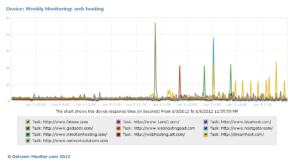Website Performance Test – Testing Olympic Game 2012 Websites [Infographic]
Website Performance Test
As one of the world’s most important sporting events the Olympic Games attract millions of people from around the world. The mass media websites that cover the Games must be able to work under unprecedented loads of traffic. The Dotcom-Monitor team decided to take the opportunity to run a website performance test analyzing how the most powerful mass media websites respond to this massive influx of website visitors during the Olympic Games.
We setup website performance monitoring using two Dotcom-Monitor solutions: ServerView and BrowserView Platforms.


